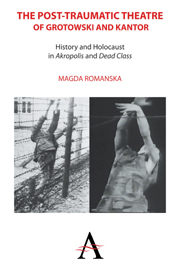 The Post-traumatic Theatre of Grotowski and Kantor
The Post-traumatic Theatre of Grotowski and Kantor from Part II - Our Memory: Kantor's Dead Class
One of Dead Class's main Jewish influences is Dybbuk or Between Two Worlds, a play by Szymon Ansky about a restless soul unable to find her way to God. Dybbuk was first staged in Moscow by the Jewish Habima Theatre, directed by Evgeny Vakhtangov, in 1922. Vakhtangov and his touring company brought the play to Cracow's Theatre Bagatela in May 1926, and returned for subsequent productions in Cracow in April 1930 and April 1938. It is unclear when Kantor saw the play, but its main theme, of a ghost entering the body of another, affected him greatly, and its influence is clearly visible in Dead Class. The title Dybbuk comes from dibuk meruach raa, which literally translates as “possessed by a bad spirit.” In Jewish folklore, the term dybbuk refers to a dead person's soul. In Jewish mysticism, the soul is always on borrowed time during life; in death, it is returned to its rightful owner, God. Ansky's Dybbuk is a love story with mystical overtones; the father marries off his daughter, Lea, to a man other than her beloved Chanan. Heartbroken, Chanan commits a mortal sin by pronouncing the unpronounceable name of God and dies. Because he has sinned, his soul cannot find peace, and Lea invites it to her wedding. Chanan's soul enters her body, and she breaks off her engagement to the other man. Through Kaballah, the father soon realizes that Chanan is the son of a deceased friend; the father and this friend had agreed that their children would one day marry.
To save this book to your Kindle, first ensure no-reply@cambridge.org is added to your Approved Personal Document E-mail List under your Personal Document Settings on the Manage Your Content and Devices page of your Amazon account. Then enter the ‘name’ part of your Kindle email address below. Find out more about saving to your Kindle.
Note you can select to save to either the @free.kindle.com or @kindle.com variations. ‘@free.kindle.com’ emails are free but can only be saved to your device when it is connected to wi-fi. ‘@kindle.com’ emails can be delivered even when you are not connected to wi-fi, but note that service fees apply.
Find out more about the Kindle Personal Document Service.
To save content items to your account, please confirm that you agree to abide by our usage policies. If this is the first time you use this feature, you will be asked to authorise Cambridge Core to connect with your account. Find out more about saving content to Dropbox.
To save content items to your account, please confirm that you agree to abide by our usage policies. If this is the first time you use this feature, you will be asked to authorise Cambridge Core to connect with your account. Find out more about saving content to Google Drive.